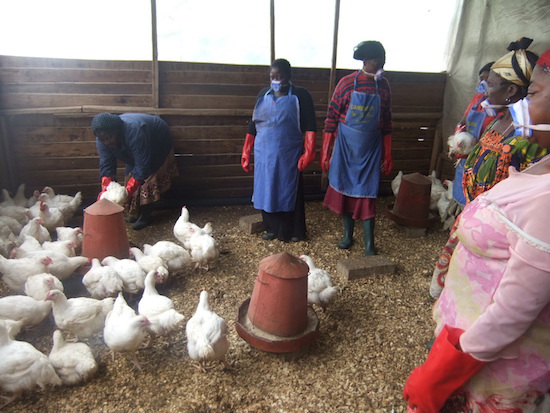Chicken woman has a lesson on fowl play for SA

IOL | 14 August 2018
Chicken woman has a lesson on fowl play for SA
The story of Cameroon’s poultry industry should be both a cautionary tale and an inspiring one for South Africa. If a country with far fewer resources could turn the tide on dumping, there is no reason why we cannot and should not.
They call her the chicken woman: Yvonne Takang, who spearheaded Cameroon’s successful fightback against the predatory trade practices that came close to destroying that country’s poultry industry.
It’s a nickname she carries proudly, and with undiminished enthusiasm for the cause she’s been championing since 2003. Because although dumping is not happening at the moment, there is always the threat that it might resurface; and the need to pressure and persuade government to create the environment in which the industry can deliver what consumers want, is ever present.
To understand Takang’s proud role, one needs to go back about 20 years to where this story started.
In the early 1990s, Cameroon’s chicken farmers produced 30000 to 40000 tons of chicken a year and they did good business. Then, in 1995, Cameroon became a member of the World Trade Organisation and acceded to the agreement on agriculture that capped import duties. This, combined with changing consumer patterns in Europe, had a far-reaching effect on the country’s poultry landscape.
Farmers noticed the decline in business and raised the alarm, drawing attention to the fact that frozen chicken pieces had become available for the first time in Cameroon.
In South Africa, frozen chicken is an everyday product; not so in Cameroon where consumers buy whole chickens, often live, from the markets. There are no facilities to slaughter chickens on a large scale or to prepare and sell frozen pieces.
People such as Takang, who heard and responded to the farmers’ pleas, followed the trail of the frozen chicken to the ports. The culprits were revealed to be ships from the EU and South America. Further sleuthing identified Belgium, France and Germany as the main sources of the chicken pieces.
From 956 tons in 1996, chicken imports had soared to more than 22000 tons in 1999.
“Not only chicken farmers were feeling the pinch,” says Yvonne. “The whole supply chain was being affected. Maize and soya farmers were threatened, as were the people who weaved the baskets in which chickens were sold at the markets.”
Globalisation had opened Cameroon’s market without affording it any reasonable protection. But the people most affected were not about to roll over. In 2003, the civil-society organisation ACDIC (Civil Association for the Defence of Collective Interests) was founded and launched an advocacy campaign backed with powerful evidence. Laboratory studies had shown that a staggering 85% of the imported chicken pieces were not fit for human consumption - supporting anecdotal evidence of guests at weddings and funerals falling ill and even dying - and economists had calculated that the local economy was losing 300 billion Central African francs (about R7.5billion) a year to chicken imports - making it glaringly obvious that the problem was far greater than a few farmers losing their livelihoods.
In addition, about 300000 jobs had disappeared. This was not healthy trade, it was clearly dumping.
A hallmark of ACDIC’s modus operandi was to mobilise consumers and farmers, persuading them it was time to come together.
“To succeed in such a campaign you have to touch everyone who feels the pain,” Takang says. The campaign’s first show of force was more than 5000 people protesting in the streets.
The civil society approach was also taken to Europe. As the message spread, European activists took to the streets in support of Cameroon’s assertions that it did not need the chicken that was being imported and that, in fact, the country was capable of producing all it needed. “It was incredibly important to bring together as many organisations as possible,” says Takang.
In addition, ACDIC petitioned the government to enforce its existing import-limiting legislation and Takang travelled to Brussels to make her country’s case at the European Parliament.
Three years later, in 2006, the campaign and Takang’s tenacity were rewarded when Cameroon obtained a ban on chicken imports. Along the way she had received threatening letters and had even spent a day behind bars.
When the ban came, the local industry was producing 30000 tons a year. Today production stands at 90000 tons and Cameroon is exporting chickens to its neighbours in the sub-region.
While it remains illegal to import chicken to Cameroon, the pressure is not off. The EU threatens now and again to force Cameroon to open its markets, given its status as a signatory to the Economic Partnership Agreement, and even from inside the country threats surface.
An example was an unsubstantiated government announcement a year or two ago that consumers had to buy only imported chicken because the domestic birds had been infected with bird flu. “I took to the media outlets to debunk the story and to tell consumers they would be perfectly safe as long as they cooked their meat properly,” says Takang. “That’s why I say you have to keep watch.”
A feature of Cameroon’s chicken market, following the campaign, is that consumers have become activists. They understand that the cheap chicken pieces are bad for their health and for the health of the country’s economy, and continue to demand local chicken.
But the unavailability of locally produced chicken pieces is a real issue. Yvonne has now taken up the cudgels for slaughterhouses and refrigeration facilities to be built so Cameroonians can buy portions when they cannot afford whole birds.
“The one thing you should know is that African economies rest on agriculture with a big A,” says Takang. “When that sector is affected, the country’s economy goes down.
"We should fight very hard to protect agriculture on this continent.”





